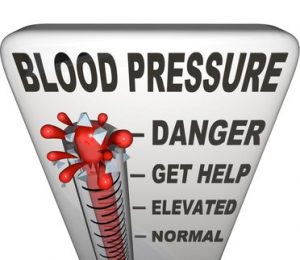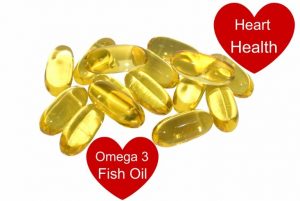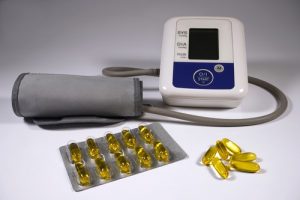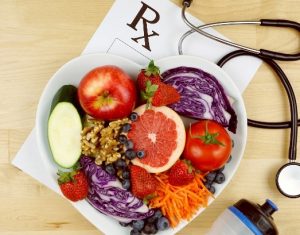What Does the FDA Say About Omega-3 Benefit Claims?
Author: Dr. Stephen Chaney
Among omega-3 benefits is lower high blood pressure. That claim can be made according to the FDA.
 Heart Disease is still the number 1 cause of death in this country. And, while deaths from heart disease have been declining in recent years, deaths due to high blood pressure have been increasing. That is concerning because:
Heart Disease is still the number 1 cause of death in this country. And, while deaths from heart disease have been declining in recent years, deaths due to high blood pressure have been increasing. That is concerning because:
High blood pressure is a killer! It can kill you by causing heart attacks, strokes, congestive heart failure, kidney failure and much more.
High blood pressure is a serial killer. It doesn’t just kill a few people. It kills lots of people. The American Heart Association estimates that high blood pressure directly or indirectly caused 410,000 deaths in 2014. That is almost 1 person every second and represents a 41% increase from 2000. It’s because high blood pressure is not a rare disease.
- 32% of Americans have high blood pressure, also called hypertension, (defined as a systolic blood pressure of 140 mm Hg or more or a diastolic blood pressure of 90 mm Hg or more).
- Another 33% of Americans have prehypertension (systolic blood pressure of 120-139 mm Hg or diastolic blood pressure of 80-89 mm Hg).
That’s over 65% of Americans with abnormal blood pressure!
High blood pressure is a silent killer. That’s because it is a very insidious disease that sneaks up on you when you least expect it. Systolic blood pressure increases 0.6 mm Hg/year for most adults over 50. By age 75 or above 76-80% of American adults will have high blood pressure. Even worse, many people with high blood pressure have no symptoms, so they don’t even know that their blood pressure is elevated. For them the first symptom of high blood pressure is often sudden death.
Blood pressure medications can harm your quality of life. Blood pressure medications save lives. However, like most drugs, blood pressure medications have a plethora of side effects – including weakness, dizziness, fainting, shortness of breath, chest pain, nausea, diarrhea or constipation, heartburn, depression, heart palpitations, and even memory loss. The many side effects associated with blood pressure medications lead to poor compliance, which is probably why only 46% of patients with high blood pressure are adequately controlled.
You do have natural options. By now you are probably wondering whether there are natural approaches for controlling your blood pressure that are both effective and lack side effects. The answer is a resounding YES! I’ll outline a holistic natural approach for keeping your blood pressure under control in a minute but let me start with the FDAs recent approval of what they call “qualified claims” that omega-3s lower blood pressure.
What Does the FDA Say About Omega-3 Benefits?
 In my book “Slaying The Supplement Myths” I talk about the “dark side” of the supplement industry. There are far too many companies who try to dupe the public by making outrageous and unsubstantiated claims about their products.
In my book “Slaying The Supplement Myths” I talk about the “dark side” of the supplement industry. There are far too many companies who try to dupe the public by making outrageous and unsubstantiated claims about their products.
Only the FDA stands between us and those unscrupulous companies, and they take their role very seriously. That is why it is big news whenever the FDA allows companies to make health claims about their products.
Even then, the FDA is very cautious. They allow what they call “qualified” health claims. Basically, that means they are saying there is enough evidence that the health claim is probably true, but not enough evidence to say it is proven.
Of course, if you understand the scientific method, you realize there will always be some studies on both sides of every issue. That is why the only health claims the FDA allows are qualified health claims.
With that background in mind, let’s look at the qualified health claims the FDA allows for omega-3 benefits.
- Since 2004 the FDA has allowed the qualified claim “Supportive but not conclusive research shows that consumption of EPA and DHA omega-3 fatty acids may reduce the risk of coronary heart disease.”
- A few weeks ago, they added five qualified health claims about omega-3s and blood pressure. The 5 claims are very similar, so I will only list two below for the sake of brevity.
- “Consuming EPA and DHA combined may reduce blood pressure and reduce the risk of hypertension, a risk factor for CHD (coronary heart disease).”
- Consuming EPA and DHA combined may reduce the risk of CHD (coronary heart disease) by lowering blood pressure.
- Of course, they add the usual wording about the evidence being inconsistent and inconclusive.
Omega-3 Benefits?
 We’ve known for some time that omega-3 fatty acids help lower blood pressure, but two recent studies were instrumental in convincing the FDA to allow these qualified health claims. These studies have highlighted just how strong the effect of omega-3s on lowering blood pressure is.
We’ve known for some time that omega-3 fatty acids help lower blood pressure, but two recent studies were instrumental in convincing the FDA to allow these qualified health claims. These studies have highlighted just how strong the effect of omega-3s on lowering blood pressure is.
The first study was a meta-analysis of 70 randomized, placebo-controlled clinical trials of long chain omega-3 (EPA + DHA) supplementation and blood pressure (Miller et al, American Journal of Hypertension, 27: 885-896, 2014 ).
This study showed:
- In the group with normal blood pressure at the beginning of the study EPA + DHA supplementation decreased systolic blood pressure by 1.25 mm Hg.
- Given that systolic blood pressure rises an average of 0.6 mm Hg/year in adults over 50, the authors estimated that omega-3 supplementation alone would delay the onset of age-related high blood pressure by 2 years.
- In the group with elevated blood pressure not taking medication at the beginning of the study, EPA + DHA supplementation decreased systolic blood pressure by an impressive 4.51 mm Hg and diastolic blood pressure by 3.05 mm Hg.
- The authors noted that this decrease in systolic blood pressure could “prevent an individual from requiring medication [with all its side effects] to control their hypertension” or decrease the amount of medication required.
However, the doses of omega-3s used in these studies ranged from 1 to over 4 grams/day (mean dose = 3.8 grams/day). That sparked a second study (Minihane et al, Journal of Nutrition, 146: 516-523, 2016) to see whether lower levels of omega-3s might be equally effective. This study was an 8-week double-blind, placebo-controlled study comparing the effects of 0.7 or 1.8 grams of EPA + DHA per day (versus an 8:2 ratio of palm and soybean oil as a placebo) on blood pressure.
This study showed:
- In the group with normal blood pressure at the beginning of the study, EPA + DHA supplementation caused no significant decrease in blood pressure. This could be due to the smaller number of subjects or the lower doses of EPA + DHA used in this study.
- In the group with elevated blood pressure not taking medication at the beginning of the study, EPA + DHA supplementation decreased systolic blood pressure by 5 mm Hg and, the effect was essentially identical at 0.7 grams/day and 1.8 grams/day.
- The authors concluded “Our data suggest that increased EPA + DHA intakes of only 0.7 grams/day may be an effective strategy for blood pressure control.”
A Holistic Approach to Lower High Blood Pressure
 The FDA’s allowed claims about omega-3s are good news indeed, but that’s not the only natural approach that lowers blood pressure. You have lots of other arrows in your quiver. For example:
The FDA’s allowed claims about omega-3s are good news indeed, but that’s not the only natural approach that lowers blood pressure. You have lots of other arrows in your quiver. For example:
- The DASH diet (A diet that has lots of fresh fruits and vegetables; includes whole grains, low fat dairy, poultry, fish, beans, nuts and oils; and is low in sugar and red meats) reduces systolic blood pressure by 5-6 mm Hg. [Low fat, low carb and Mediterranean diets also lower blood pressure, but not by as much as the DASH diet].
- Reducing sodium by about 1,150 mg/day reduces systolic blood pressure by 3-4 mm Hg.
- Reducing excess weight by 5% reduces systolic blood pressure by 3 points.
- Doing at least 40 minutes of aerobic exercise 3-4 times/week reduces systolic blood pressure by 2-5 mm Hg.
- Nitrates, whether derived from fresh fruits and vegetables or from supplements probably also reduce blood pressure, but we don’t yet know by how much.
If you’ve been keeping track, you’ve probably figured out that a holistic lifestyle that included at least 0.7 grams/day of long chain omega-3s (EPA + DHA) plus the other omega-3 benefits in the list above could reduce your systolic blood pressure by a whopping 18-22 mm Hg. What
That’s significant because, the CDC estimates that reducing high systolic blood pressure by only 12-13 mm Hg could reduce your risk of:
- Stroke by 37%.
- Coronary heart disease by 21%.
- Death from cardiovascular disease by 25%.
- Death from all causes by 13%.
A Word of Caution
While holistic approaches have the potential to keep your blood pressure under control without the side effects of medications, it is important not to blindly rely on holistic approaches alone. There are also genetic and environmental risk factors involved in determining blood pressure. You could be doing everything right and still have high blood pressure. Plus, you need to remember that high blood pressure is a silent killer that often doesn’t have any detectable symptoms prior to that first heart attack or stroke.
My recommendations are:
- Monitor your blood pressure on a regular basis.
- If your blood pressure starts to become elevated, consult with your doctor about starting with natural approaches to bring your blood pressure back under control. Doctors are fully aware of the side effects of blood pressure medications, and most doctors are happy to encourage you to try natural approaches first.
- Continue to monitor blood pressure as directed by your doctor. If natural approaches are insufficient to bring your blood pressure under control, they will prescribe the lowest dose of blood pressure medication possible to get your blood pressure where it needs to be.
- Don’t stop making holistic lifestyle choices to reduce blood pressure just because you are on medication. The more you do to keep your blood pressure under control with a healthy diet and lifestyle, the less medication your doctor will need to use (That means fewer side effects).
The Bottom Line
Heart Disease is still the number 1 cause of death in this country. And, while deaths from heart disease have been declining in recent years, deaths due to high blood pressure have been increasing. That is why anything we can do lower blood pressure naturally is important. What does the FDA say about omega-3s and blood pressure?
- Since 2004 the FDA has allowed the qualified claim “Supportive but not conclusive research shows that consumption of EPA and DHA omega-3 fatty acids may reduce the risk of coronary heart disease.”
- A few weeks ago, they added qualified health claims about omega-3s and blood pressure. For example, they now allow the following claims.
- “Consuming EPA and DHA combined may reduce blood pressure and reduce the risk of hypertension, a risk factor for CHD (coronary heart disease).”
- Consuming EPA and DHA combined may reduce the risk of CHD (coronary heart disease) by lowering blood pressure.
For more information on the studies that convinced the FDA to allow claims about omega-3s and blood pressure and for a discussion of holistic natural approaches for lowering blood pressure, read the article above.
These statements have not been evaluated by the Food and Drug Administration. This information is not intended to diagnose, treat, cure or prevent any disease.
